|
Immigrants came through Ellis Island ready to start a new life in a new country or to continue a career in a new country. Read on to learn more about some of the Notable Immigrants who pass through the island. Click on a name to select, or scroll down the page to see names A through F. Louis Adamic, Lucien Aigner, Isaac Asimov, Charles Atlas, Mischa Auer, Benjamin Nnamdi Azikiwe, Abraham Beame, Irving Berlin, Ettore "Hector" Boiardi, Irene Bordoni, Frank Capra, Claudette Colbert, Donald Crisp, Xavier Cugat, Karl Dane, Max Factor, Hubert Fauntleroy Julian, Father Edward Flanagan, Felix Franfurter, Douglas Fraser.
. Click here for the list of immigrants whose last names begin with G through L. Click here for the list of immigrants whose last names begin with M through Z.
Louis Adamic, Writer, March 23, 1898 - September 4, 1951
Louis Adamic, an author, journalist, and editor, was born, Alojzi Adamic, in Blato, Slovenia (then part of of Austria Hungary).He came to the United States in at the end of 1912. He was briefly detained on Ellis Island since he only possessed seven dollars, less than the minimum required to enter the United States, until his uncle assisted him. As a social critic and writer, Adamic focused on the experiences of immigrants.His books include Dynamite: The Story of Class Violence in America (1931), Laughing in the Jungle: The Autobiography of an Immigrant in America (1932), and The Return of the Native: An American Immigrant Visits Yugoslavia and Discovers His Old Country (1934).He continued writing about the immigrant experience in the fiction novel Grandsons: A Story of American Lives (1935) and in the books Cradle of Life: The Story of One Man's Beginnings (1936), My America (1938), From Many Lands (1940), Two-Way Passage (1941), My Native Land (1943) and The Eagle and the Root (1950). Adamic was an early proponent of "multiculturalism."In the 1940s, he edited the literary magazine, Common Ground, which focused on the contributions of the many ethnicities, races, and religions living in the United States.
Lucien Aigner, Photojournalist, September 14, 1901 - March 29, 1999
Lucien Aigner, was born Lazlo Aigner, in Ersekujvar, Austria-Hungary (now part of Slovakia).He came to the United States in 1939, escaping the Nazi occupation of Europe. Although having studied law in college, Aigner began his career as a journalist in the 1920s for the Hungarian newspaper association Az Est.It was during the time he was working for Az Est that he started to use a Leica camera to take pictures to accompany his articles.The portable Leica increased the size of the images he could photograph and allowed him to capture scenes under existing light conditions, resulting in more spontaneous and natural images. In 1926, Aigner moved to France where he cofounded a press agency and continued working as a reporter and photojournalist.He covered celebrities and politicians throughout Europe.While covering the Stresa Conference in 1935, Aigner took a photograph of Italian dictator Benito Mussolini.This photograph brought him notoriety and ended up on the cover of Newsweek magazine. In December 1938, he fled France with his wife and young son to escape the Nazi occupation of Europe.In order to leave France without waiting for an immigration visa, which could take months or years, he applied for a visitor's visa.He arrived in New York in January 1939 and was detained overnight on Ellis Island with his wife and son.Since he was a prominent journalist in Europe, he answered the inspectors questions to their satisfaction and he and his family were admitted to the United States. In the United States, Aigner continued freelancing as a photojournalist and opened a portrait studio in Vermont.In later years, he organized his collection of negatives and photographs of celebrities, politicians, and regular people.He died at the age of 97 and is remembered as a pioneering early twentieth century photojournalist.
Isaac Asimov, Writer, January 2, 1920 - April 6, 1992
Isaac Asimov, born Isaak Yudovich Ozimov in Petrovichi, USSR , came to the US through Ellis Island in 1923.Asimov grew up in Brooklyn where his parents owned a series of candy stores. Asimov wrote and edited more than 500 books and many short stories, among them such science fiction masterpieces as Nightfall, Pebble in the Sky, The Caves of Steel, The Naked Sun, the Foundation Trilogy, I, Robot and The Gods Themselves.He also wrote almost 40 popular books on science.His writing awards include the Hugo and Nebula Awards. Asimov earned a Ph.D. in biochemistry from Columbia University and was a member of the faculty of the Boston University School of Medicine.
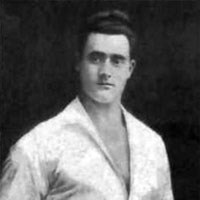
October 30, 1892 - December 23, 1972 Charles Atlas, the "world's most perfectly developed man" was born Angelo Siciliano in Acri, Italy. Along with his grandparents, mother, and aunt he sailed in steerage aboard the SS Roma for the United States in 1903. They arrived on Ellis Island on September 11th of that year and was temporarily detained. The immigration doctors noted that his grandparents had a number of medical problems. They finally deemed the medical issues minor and the family proceeded to their new home in New York City. Atlas maintained that as a child bullies taunted him and he realized the necessity of developing himself physically. He developed an exercise system called "Dynamic Tension" and created the company, Charles Atlas Ltd to sell it. This business, with its accompanying advertising campaign was one of the earliest and longest lasting mail order businesses. The business that he founded continues to this day.
Mischa Auer, Actor, November 17, 1905 - March 5, 1967
Mischa Auer was born Mikhail Semyonovich Unskovsky in St. Petersburg, Russia.He came to the United States in 1920 aboard the S.S. Dante Alighieri from Genoa.He arrived at Ellis Island on August 22, 1920 where he was detained because he was traveling unaccompanied and was only fourteen years old.He was held for a hearing before the Board of Special Inquiry and was released on August 25. In an acting career that spanned almost four decades, Auer usually played excitable, explosive, and very emotional characters.These roles were very much removed from the man himself, who was quiet, introspective and scholarly and who reportedly could speak six languages. After seeing Auer perform for the Yiddish Bertha Kalich Company in Los Angeles, director Frank Tuttle hired him in 1928 to act in the comedy Something Always Happens.For the next ten years he often played the character of the evil foreigner, often without being credited. His roles turned more comedic after his Oscar nomination for his part in the 1936 My Man Godfrey. Critics maintain that his best acting at this time occurred in the films Vogues of 1938 (1937) and You Can't Take it With You (1938).Auer spent his last years making movies in Europe and appearing on television shows in the United States.
Benjamin Nnamdi Azikiwe, First President of Nigeria, November 16, 1904 - May 11, 1996
Although never an Ellis Island Immigrant, Benjamin Nnamdi Azikiwe, a Nigerian politician and the first president of Nigeria, was detained on the Ellis Island for short period of time in September 1925.He was detained when he arrived in New York from Liverpool, England, sailing on the S.S. Scythia, because his student visa had expired. Azikiwe, or "Zik" as he was popularly known, studied at Hope Waddell Training Institute in Calabar, Nigeria before coming to the United States.He attended Howard University and then Lincoln University in Pennsylvania.He received his undergraduate degree from Lincoln in 1930 and master's degrees from the University of Pennsylvania and Columbia University.Before leaving the United States, he taught briefly at Lincoln University. In 1934, Azikiwe returned to Africa to edit the African Morning Post in 1934. Shortly thereafter, he created the West African Pilot, a publication in which he fostered Nigerian nationalism. His political career started with his co-founding of the National Council of Nigeria and the Cameroons in 1944.Two years later, in 1946, he became the secretary-general of the National Council.In 1947 he was elected to the Legislative Council of Nigeria. When Nigeria finally won its independence in 1963, Azikiwe became its first president.A military coup deposed him in 1966.
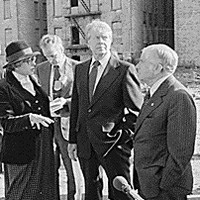
Abraham Beame, the 104th Mayor of New York City, was born Abraham Birnbaum in England to Jewish parents from Poland. He came to the U.S. as an infant in 1906, traveling with his mother and two brothers to join his father in New York. Early in his career, Abraham Beame cofounded an accounting firm. He also taught accounting in Richmond Hill High School until 1945. In 1946 Beame obtained his first political appointment as New York City's assistant budget director. In 1952 he became budget director and in 1961 made a successful run for City Comptroller. He left this post in 1965 and assumed it again after winning the election in 1969. In 1974, Beame was elected Mayor of New York City in a four-way race and was the first Jewish person to hold this position. His term lasted until 1977.
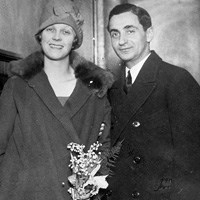
Library of Congress Irving Berlin was born Israel Isidore Beilin in Russia (now Belarus).In 1893, when he was 5 years old, he arrived at Ellis Island with his parents and five siblings. Recognized as one of America's most famous songwriters, Irving Berlin wrote approximately 1,500 songs over six decades, including scores for Broadway shows and Hollywood films.In 1911, he had his first international hit when he wrote Alexander's Ragtime Band. Many of Berlin's songs became popular anthems.In 1918, Berlin wrote the country's unofficial national anthem God Bless America.He continued composing memorable songs into the 1970s for such works as Top Hat (1935), Holiday Inn (1942), White Christmas (1954) and Call Me Madam (1950).
Ettore "Hector" Boiardi, Chef / Entrepreneur October 22, 1897 - June 21, 1990
"Chef Boy-Ar-Dee" was born Ettore Boiardi in Piacenza Italy in 1897. He came to the United States in 1914 at the age of 16 aboard the S.S. La Lorraine and arrived in New York on May 9. Boiardi worked as a hotel chef in New York City and West Virginia before opening his own restaurant in 1926. After receiving multiple requests from patrons for his pasta and sauce, he decided to open a factory and start selling his products directly to the public. The Chef Boy-Ar-Dee company (based on the phonetic spelling of his name) was one of the first packaged Italian food companies in the United States. The company produced rations supplying allied troops during World War II for which he was recognized by the U.S. War Department. Although Boiardi sold the company to American Home Food Company in 1946, he remained a consultant for the firm. He also appeared in print and television advertising for his products from the 1940s through the 1960s.
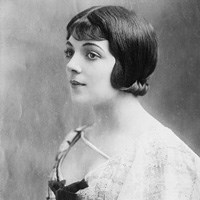
Library of Congress Irene Bordoni was born in Ajaccio, Corsica, France to an Italian family and came to the United States through Ellis Island in 1907 at the age of 22.Prior to her departure, she had worked as a personal maid. Her employer paid her passage. Bordoni made her Broadway debut in 1912 and by the 1920s she achieved star recognition.Cole Porter featured her in Paris, a role the actress repeated in the film version of 1929.She also appeared in a number of other movies, including The Show of Shows (1929), Du Barry Did Alright (1937) and with Bob Hope, another famous Ellis Island immigrant, in Louisiana Purchase (1941).Well into her fifties she returned to the American stage, where she played "Bloody Mary" in the Broadway production of South Pacific.
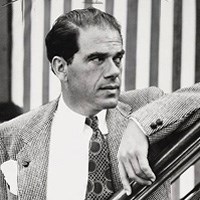
Library of Congress Frank Capra was born Francesco Rosario Capra in Bisacquino, Sicily, Italy and came to the United States in 1903 with his father Salvatore and 16-year old sister, Giuseppa. Capra was one of the most successful Hollywood directors in the 1930s and 1940s producing feel-good movies that featured the triumph of the common man in idealized American settings.His films included It Happened One Night (1934), which was the first movie to win all top five Oscars, including Best Picture.His career continued with classic films such as Mr. Deeds Goes to Town (1936), You Can't Take It With You (1938), Lost Horizon (1937), Mr. Smith Goes to Washington (1939), Meet John Doe (1941), Arsenic and Old Lace (released 1944), It's a Wonderful Life (1946), Here Comes the Groom (1951), A Hole in the Head (1959) and Pocketful of Miracles (1961).
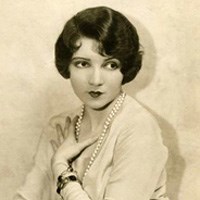
Claudette Colbert was born Émilie Chauchoin in Saint-Mande, France and sailed with her family from Le Havre to the United States on the S.S. Chicago on September 30, 1911. They landed in New York on October 9, 1911. Her career began in 1923 on Broadway with a minor part in The Wild Westcots. She used the name "Claudette" after her father's middle name Claude and "Colbert" from her maternal grandmother's maiden name.She went on to perform in a series of successful plays on Broadway and in London's West End. In 1927 the theatrical producer Leland Hayward proposed Colbert for a part in the silent film For the Love of Mike (1927).After signing with Paramount Pictures in 1928, she costarred with Edward G. Robinson in her first sound production, The Hole in the Wall (1929).For her performance in It Happened One Night (1934) she won the Academy Award for Best Actress.The following year she received a nomination for Private Worlds (1935) and again in 1944 a nomination for Since You Went Away (1944).Altogether, Colbert made 65 films that included The Sign Of The Cross (1932), Cleopatra (1934), Bluebeard's Eighth Wife (1938), Midnight (1939), The Palm Beach Story (1942), Tomorrow Is Forever (1946), The Egg and I (1947) and Three Came Home (1950). In the 1950's she returned to the stage and appeared occasionally in television roles.Colbert was recognized by the Kennedy Center Honors for lifetime achievement in 1989.
Donald Crisp, Actor July 27, 1882 - May 25, 1974
Donald Crisp was born George William Crisp in London on July 27, 1882. When he was 24 years old, Crisp sailed from Liverpool, England aboard the S.S. Carmania and landed in New York on July 25, 1906. With the 1908 short The French Maid, he began a career of both acting and directing that would last more than half a century. He had already worked on over 50 films when he played General Grant in DW Griffith's Birth of a Nation (1915). As a director, he made nearly 70 films including The Navigator (1924) with Buster Keaton and Don Q Son of Zorro (1925). He returned to acting exclusively in 1930 after the advent of sound pictures. His acting credits include Lily of the Tenements (1911), Red Dust (1932), Mutiny on the Bounty (1935), The Charge of the Light Brigade (1936), The Life of Emile Zola (1937), Jezebel (1938), Wuthering Heights (1939), The Sea Hawk (1940), Lassie Come Home (1943), National Velvet (1944) Prince Valiant (1954), The Long Gray Line and The Man From Laramie (both 1955), The Last Hurrah (1958), Pollyanna (1960), and Spencer's Mountain (1963). In 1942 he won an Academy award for Best Supporting Actor in How Green Was My Valley (1941).
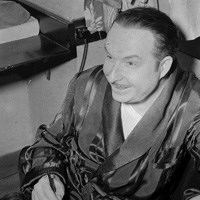
Credit: William P. Gottlieb/Ira and Lenore S. Gershwin Fund Collection, Music Division, Library of Congress. Xavier Cugat was born Francisco De Asis Javier Cugat Mingall De Cru Y Deulofeo in Gerona, Spain.He was a pioneer of Latin American dance music in the United States and the world and entered the United States through Ellis Island with his family on July 7, 1915. During Cugat's career, which spanned over seven decades, he helped to popularize the Tango, the Cha-cha, the Mambo and the Rumba.His most popular songs, which included El Manicero, Perfida and the original recording of Babalu, were played by his own group named The Latin American Band. This orchestra, renamed the Xavier Cugat Orchestra, found a home at New York City's Waldorf Astoria hotel and was the house band for sixteen years. Cugat and his work also found its way into the movies. He appeared in such films as In Gay Madrid (1930), You Were Never Lovelier (1942), Bathing Beauty (1944)and Weekend At The Waldorf (1945), Holiday in Mexico (1946), A Date with Judy (1948), Chicago Syndicate (1955) and Desire Diabolique (1959).
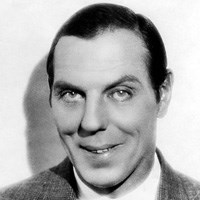
Karl Dane, born Rasmus Karl Thekelsen Gottlieb in Copenhagen, Denmark, passed through Ellis Island on February 11, 1916. Dane's movie career began in late 1917 when he obtained a small role in a short film produced by Vitagraph Studios.They removed his scenes and the name of the film has since been lost.In 1918, he appeared in My Four Years in Germany, an incredibly successful film that helped launch his career.He acted in a number ofsilent movies, including The Big Parade (1925), The Son of the Sheik (1926), Billy the Kid (1930) and The Big House (1930). With the advent of sound in movies, Dane discovered that he shared a problem with many immigrant non-native English speaking people.His accent interferredwith his work.The production companies lost interest in him and in 1934 Karl Dane committed suicide.
Max Factor, Cosmetician, September 15, 1872 - August 30, 1938
Max Factor was born Maksymilian Faktorowicz in Lodz, Poland, then part of Czarist Russia. A successful cosmetician and wigmaker, Factor was appointed by Russian nobility to be the official cosmetics expert to the Royal Family and the Imperial Russian Grand Opera. Concerned about growing anti-Semitism in Russia, Factor and his wife and children left Europe through the Port of Hamburg on February 12, 1904 and traveled via steerage class on the S.S. Moltke to America. According to the ship's manifest, they arrived at Ellis Island on February 25, 1904. In 1908 Factor moved with his family to Los Angeles to sell makeup and wigs to the growing film industry. In 1909 he founded Max Factor & Company. A pioneer of theatrical makeup, the Academy of Motion Picture Arts and Sciences bestowed an honorary Academy award on him in 1929 for producing cosmetics that enhanced the appearance of actors in black and white movies. In the 1930's, Max and his son Frank (who adopted the name Max Factor, Jr. after his father's death) developed Pan-Cake, a makeup that worked well with color cinematography. With Factor's success in Hollywood, Max Factor & Company, grew into a major international cosmetics company selling makeup commercially to the public. Factor and his son, Frank, were early developers of the modern cosmetics industry.
Hubert Fauntleroy Julian, Aviator, September 20, 1897 - February 19, 1983. Hubert Julian was born in the Port of Spain, Trinidad in 1897, the son of a cocoa plantation manager. He became a celebrity aviator and parachutist in the 1920s, 30s, and 40s and cultivated his own image through self-promotion. In 1914, Julian migrated to Canada where he learned to pilot an airplane. He moved to Harlem in 1921. In 1922, he flew above Harlem during the Universal Negro Improvement Association Convention in a plane covered with UNIA mottoes. This flight led to a number of parachute jumps into Harlem neighborhoods. He had several failed attempts to acquire an airplane for a transatlantic flight to Africa, although he did make a number of record-breaking trips in the United States. During the coronation of Emperor Haile Selassie of Ethiopia, Julian performed parachuting stunts and gained favor with the emperor. When Italy invaded Ethiopia in 1935, Julian returned to Ethiopia to assist, although he fell out of favor with the emperor and returned to the United States. Confusion over whether he was an Ethiopian or British citizen led to Julian's detention on Ellis Island in 1936.This was cleared up and during World War II Julian became a naturalized American citizen. He died in Harlem in 1983.
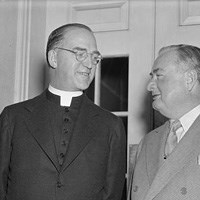
Library of Congress Edward Flanagan, the founder of Boy's Town, was born in County Roscommon, Ireland. Flanagan and his sister, posing as his wife, sailed out of Queenstown on the S.S. Celtic in late August and arrived on Ellis Island on August 27, 1904. Flanagan earned a bachelor's degree in 1906 and a master's degree in 1908 from Mount St. Mary's University in Emmitsburg, Maryland.He then attended St. Joseph's Seminary in Dunwoodie, New York and studies in Europe.He was ordained a priest in 1912 and was appointed to a parish in Nebraska. In 1917 Father Flanagan established an orphanage for homeless boys in downtown Omaha, Nebraska. He opened Boys Town in a larger facility just outside of Omaha in 1921. Boys Town provided boys between the ages of ten and sixteen the opportunity to learn a trade and get an education.In addition to having housing and schools, the town had a chapel, post office and a gymnasium.It was sometimes referred to as the "City of Little Men."While Father Flanagan was there, the orphanage became internationally well-known (and was featured in the 1938 film Boys Town starring Spencer Tracy and Mickey Rooney) and an innovator and leader in child social welfare. Flanagan's involvement in child welfare causes led him throughout the country and world.On a trip to Germany he suffered a heart attack and died on May 15, 1948.He is buried at Boys Town.
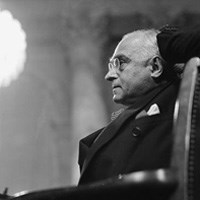
Library of Congress November 15, 1882 - February 22, 1965
United States Supreme Court Justice Felix Frankfurter was born in Vienna, Austria (then part of Austria-Hungary) in 1882.Frankfurter left Europe with his mother, three brothers and a sister aboard the S.S. Suevia departing from Naples.They arrived at Ellis Island in August 1894.His family settled on the Lower East Side where he encountered the ideas of trade unionism and socialism as he grew older. Frankfurter graduated New York City College in 1902 and entered Harvard Law School.In Harvard he worked as an editor of the Harvard Law Review.He finished Harvard having achieved one of their best academic records. In 1906 he joined the law firm of Hornblower, Byrne, Miller &Potter and the New York lawyer Henry Stimson took him on as his assistant.Subsequently, President Taft appointed Stimson to the position of Secretary of War and Stimson in turn designated Frankfurter law officer of the Bureau of Insular Affairs.He began teaching law at Harvard in 1914. Frankfurter acquired a reputation for holding progressive political views and helped found the American Civil Liberties Union.He criticized the Tennessee Anti-Evolution Law and advocated for a new trial for Nicola Sacco and Bartolomeo Vanzetti, two Italian immigrants sentenced to death for murder in a controversial and public trial in the 1920s. After serving as an advisor to President Franklin D. Roosevelt, Frankfurter was appointed by Roosevelt to the Supreme Court in 1939. He served until August 28, 1962 when he retired due to ill health.
Douglas Fraser, Labor Union Leader, December 18, 1916 - February 23, 2008
Douglas Fraser was born in Glasgow, Scotland.He came to the United States through Ellis Island in April 1923 with his mother, brother and sister from Glasgow, Scotland aboard the steamer S.S. Cameronia. From New York they traveled to Detroit to reunite with Fraser's father who had already established himself there. After some earlier jobs, Fraser started working in a Chrysler factory.He became involved with United Auto Workers of America (UAW) activities in 1936 and the Union members elected him head of the UAW Local in 1943. After serving in the United States Army, he once again devoted himself to Union activities. He played increasingly prominent roles in the UAW and its members voted him President in 1977. In 1979, he had a critical role in convincing Congress to provide federally guaranteed loans to Chrysler so the company could avoid bankruptcy. Fraser remained President of the UAW until 1983. After his retirement from the UAW, Fraser taught labor relations and history for many years at Wayne State University in Detroit. The Douglas A. Fraser Center for Workplace Issues at Wayne State was named for him.
[Back to Index] [Notable Immigrants G-L] [Notable Immigrants M-Z] |
Last updated: October 19, 2021
